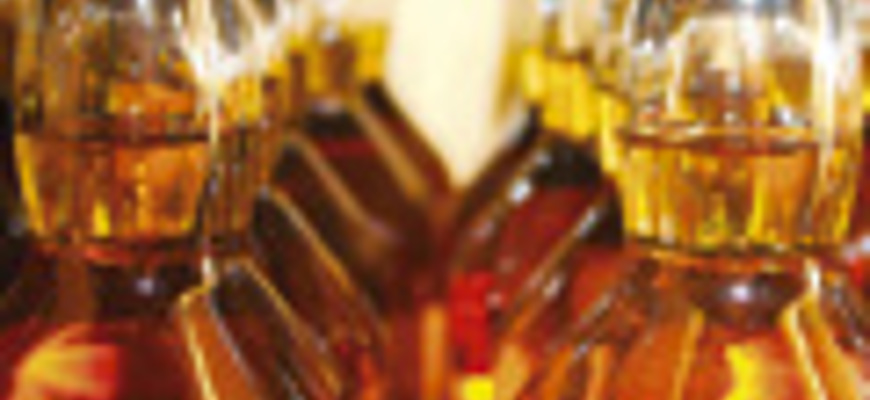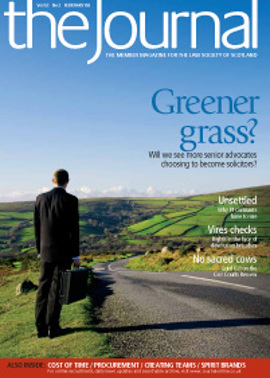Spirit of the law

There are a number of illegal practices carried out by a minority of licensees of on-premise outlets (pubs, clubs, hotels and restaurants) to increase profits and gain an unfair competitive advantage by cheating their customers.
One of the most common is the practice of refilling branded spirit bottles with cheaper, and sometimes illegal, alternatives. This has been in evidence since the first recorded survey in 1896 when 30 pubs in Glasgow had their whisky analysed for authenticity and only two were selling genuine Scotch!
More recently, in 1999, a survey of 1,000 pubs revealed that 8% were substituting at least one spirit brand at any one time. This equated to a consumer “rip off” of £43 million per annum, being the difference between the price charged for the premium product and the price that should have been charged for the cheaper alternative.
This figure was substantiated by the then Ministry of Agriculture, Fish and Food, which carried out research into the substitution of whisky.
Successful partnership
Because of this illegal activity the International Federation of Spirits Producers UK, a trade association, was formed to work with Trading Standards and environmental health authorities to help stamp out the practice. IFSP UK’s membership consists of the top five leading international brand owners: Diageo, Pernod Ricard, Bacardi-Brown Forman, Edrington and Jim Beam Global. Sister associations operate throughout the world to counteract substitution and all other forms of counterfeiting, and the production of illicit alcohol, by working with government and local enforcement authorities.
As a direct result of this public-private partnership the current substitution level in the UK, based on surveys by Trading Standards, has been reduced to less than 2% in areas that are actively enforced by authorities (the majority), and 4% elsewhere. Unfortunately word has not yet spread to the independent restaurant sector, where 12% of outlets called on by Trading Standards are still found to be substituting.
Illicit spirits and counterfeit brands
The spirits used to refill branded bottles are usually cash and carry and supermarket own-label brands, or “cheapest on display”, but there is an increasing and very worrying trend of using illegally produced spirits, particularly vodka. Many of these contain higher than safe levels of methanol (industrial alcohol) and can be toxic.
Over recent years the availability of illegal spirits (fictitious brands or brands of unknown origin) and counterfeit brands has increased. These are smuggled into or produced in the UK, and there are a number of cases of counterfeited “price-competitive vodka brands” currently being investigated in Scotland.
In March 2002 in Manchester a lady suffered a coma for 11 days after drinking unknowingly illegal vodka called Volkonof, and in September 2003 a lady in Scotland died from drinking illegal vodka, Vodka Russia. There have also been numerous cases of hospitalisation.
In the last two years HM Revenue and Customs have discovered and raided five illegal production plants, and they believe that there are still more out there. Large volumes of illegal alcohol, particularly “vodka” packaging and production equipment, have been seized, but there is evidence that thousands of bottles are still in circulation.
IFSP UK advises licensees to buy only from legitimate sources, not to refill bottles, even with the correct brand, and to ask for and keep purchase invoices.
Under the General Food Regulations 2004, reg 18, they must be able to produce the necessary paperwork to identify the source of all their spirits (and all foodstuffs).
The screening process
IFSP UK works with Trading Standards and environmental health officers to protect the consumer in a variety of ways. They supply free screening kits to check the authenticity of a wide range of brands, including a simple dipstick test for white spirits.
As this method cannot be extended to whisky, they have developed a brand authenticator, a highly sophisticated UV spectrometer, to authenticate selected brands of whisky. IFSP owns a number of these, which are loaned to authorities, free of charge, for project work.
If the screening test is failed, the officer will take formal samples for further testing by a public analyst, the findings being used as evidence.
These test kits and authenticators, which are only available to qualified enforcement officers, have been instrumental in reducing the incidence of substitution, saving consumers from being ripped off by over £30 million every year and reducing the risk of exposure to industrial and poisonous alcohol.
IFSP UK also runs training sessions, which have been attended by representatives from 24 out of the 32 enforcement authorities in Scotland in the last 18 months.
Licensing (Scotland) Act 2005
Regulations under the Act, which come into force this year, will prescribe certain offences, prosecution for which could lead to a licensee’s personal licence being revoked or temporarily suspended. The draft schedule includes the following:
- an offence under the Trade Descriptions Act 1968, s 1 (false trade description);
- an offence under s 14 (selling food or drink not of the nature, substance or quality demanded) or 15 (falsely describing or presenting food or drink) of the Food Safety Act 1990;
- an offence under s 92(1) or (2) of the Trade Marks Act 1994 (unauthorised use of trade mark, etc in relation to goods);
- all where the goods concerned are or include alcohol;
- and an offence under the Alcoholic Liquor Duties Act 1979.
Currently an offence can be reported to the local licensing board, who could then hold a hearing in terms of s 31 of the Licensing Scotland Act 1976 to establish whether the licensee is still a fit and proper person to be a holder of a licence.
Can bottles be topped up?
It has been standard practice to refill bottles, with the correct product, before a day’s trading, and to refill large display bottles from smaller ones, but not many licensees realise that this is also illegal because of recent legislation, the Duty Stamps Regulations 2006, reg 38, which prohibits the refilling of stamped bottles, and the General Food Regulations 2004, reg 18, which makes it illegal to refill a lot-marked bottle (all bottles are lot-marked), as this negates traceability.
Summary
As a result of educating licensees, increased inspections, publicised prosecutions and increased penalties there has been a significant reduction in the substitution rate, to the benefit of consumers.
However there are still too many licensees that see this practice as an easy way to make additional illegal profit, and IFSP UK will be doing everything it can to support government enforcement authorities in protecting the consumer from being ripped off and potentially exposed to toxic alcohol.
Philip Scatchard is the director of IFSP UK
e: admin@ifsp.co.uk
www.ifsp.co.uk
In this issue
- Members will decide
- Take a firm approach
- Pastures new
- A breach of protocol
- Creating real burdens in developments
- Man with a mission
- A timeless Act
- Cost in a competitive market
- Picking up the pieces
- Summary justice on trial
- Money laundering - the FAQs
- Performance guide
- Getting on the case
- "She stole our data in her underwear!"
- Trust and competence
- So wrong, so long?
- It's oh so quiet...
- Extending adoption rights
- Spirit of the law
- Scottish Solicitors' Discipline Tribunal
- Website reviews
- Book reviews
- Procuring procurement perfection - perhaps
- Repairing the standard






